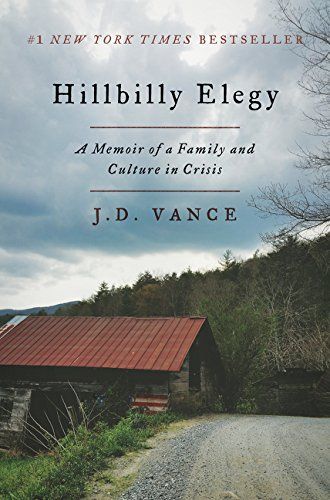Book Review - Hillbilly Elegy by J.D. Vance

!!!!SPOILERS!!!!
While perusing Facebook, I saw recommendation for this book. I had never heard of this title before that. I put a few titles on hold from the library and this was the first one that was available and I am glad. Hillbilly Elegy is an intriguing story of one man's upbringing in a "hillbilly" family and how he was able to overcome more than his fair share of adversity.
Vance spends the book detailing his upbringing starting with his family's move from the Appalachian Mountains of Kentucky to industrialized Ohio, detailing the many father figures that came and went from his life, his mother's addiction, rampant verbal abuse to and around him, and the saving grace of his grandparents. Vance's life appears to be filled with story after story of crazy hillbilly antics that would doom most to follow in their communities' footsteps of poverty, addiction, and unstable home lives. The story he tells though, is one where he was able to adapt, overcome, and eventually break out of this cyclical death spiral as a Marine, a Yale Law graduate and an author.
Using his childhood as a backdrop for a broader social discussion, Vance uses his writing to make a point; no amount of assistance, welfare, racial integration, or other aid is going to fix the pervasive issue of an unstable home life. He mentions that with the mass exodus of 'hillbillies' from Kentucky, West Virginia, and Tennessee to Ohio and the Midwest, many of their families suddenly had far greater income than they had ever experienced before, yet their overall quality of life did not improve. The children in these families did not get better grades in school, did not go on to get higher paying careers, and were not necessarily better off.
Vance spends a large portion of the book lamenting the issues of his him that prevented him from doing things as simple as doing his homework. Luckily for him, he grandparents were able to provide some form of a stable household that allowed Vance to make progress and eventually get away from the sink-hole of his nuclear family eventually joining the Marines. Joining the military, as Vance states, is one of the only ways that the condemned youth of his home could ever hope to break away and start anew.
Discussing this with a friend, her first reaction when I told her that I was reading a book about the challenges of hillbilly families in the Midwest was that the military is the only way out. My eyes were opened when I realized that this book was not just one man's struggle and subsequent analysis of the situation, this is a rampant problem.
Our country has problems with helping the poor, getting folks back on their feet after, tackling addiction, and a whole host of other issues. These problems seem to still be symptoms of something greater, something that starts inside the home, something that is inescapable for a large majority of those who are held in its grasp. That something greater is what Vance spends the entire book describing without naming, using the lens of his life. Perhaps there is not a word for what he is describing, to me he was describing stability, understanding, and compassion.
Stability in the home (or lack thereof) leaves those who live in the home without a place to relax, learn, and grow. Understanding is a critical piece of this; parents understanding each other, parents understanding children, children understanding parents (maybe not), and all of us understanding each other. Understanding that addiction is an illness not a choice, understanding that those in poverty probably aren't lazy, understanding that mental health plays a large role in America's homeless population, understanding that how you were raised can have a direct impact on how you live, and understanding that everyone has a story, a past, a wound that requires compassion from others.
In the back of my head I can hear the voices saying 'compassion is for sissies' or 'these millennials and their safe spaces', or even 'these people just need to learn how to work hard.' While these types of statements may be true in some cases, they are not the norm and do nothing to help the situations that Vance describes. If we are to move forward as a society we must stop demonizing those who we have deemed to have problems and start finding solutions, we need to stop judging others by our own lens, and we must start understanding each other.